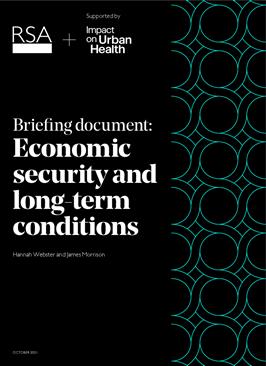Managing both physical and mental health conditions alongside financial health can be a difficult task, and an experience which this research specifically seeks to explore
Through new analysis of Understanding Society data, we find that at the point of diagnosis, when living with long-term conditions and in looking to the future, people living with multiple long term-term conditions experience specific challenges in maintaining economic security. We also find that compared to those with one or no long-term conditions, those with multiple long-term conditions have the lowest levels of subjective economic security.
In this briefing, supported by a full data report, we identify six recommendations for national government and local systems to support people living with multiple long-term conditions. Specifically, we recommend:
- To provide tailored support on economic security for those managing a long-term condition diagnosis, integrated care systems, in partnership with local authorities and job centres and other stakeholders, should establish local economic security hubs.
- To ensure that a need for flexibility at work does not undermine economic security, national government should expand eligibility for, and increase the level of, statutory sick pay.
- To support the needs of people with multiple long-term conditions in work and expand the suitability of employment options for those looking for work, local authorities should encourage employers to specifically support those living with long-term conditions with a commitment to health inclusivity.
- The Department for Work and Pensions must create a system that better supports people living with long-term conditions by reforming Universal Credit, Housing Benefit and Carer’s Allowance. This should include a reversal of the cut to the £20 Universal Credit uplift.
- With a view to exploring a new model of state support based on stabilising incomes and building security in the future, local authorities, with support from national government, should explore a Universal Basic Income (UBI) trial with a specific focus on health and wellbeing outcomes and those living with multiple long-term conditions.
- National government must ensure that any recovery plan from Covid-19 includes a specific consideration of those living with multiple long-term conditions, including a risk assessment and an inclusive design for the ‘Plan for Jobs’.
pdf 851.4 KB
Funder

Related articles
-
A just transition: visions and takeaways of participatory futures in Scotland
Blog
Fabian Wallace-Stephens
A blog on the rural and post-industrial perspectives on the just transition in Scotland highlighting some of the key takeaways which, if implemented, will help achieve this vision.
-
Rural and post-industrial perspectives on the just transition
Report
Fabian Wallace-Stephens Emma Morgante Veronica Mrvcic
This report explores how changes to the energy system could impact specific Scottish regions and bring together citizens to collectively imagine better futures.
-
The RSA is pleased to announce the launch of its Financial Services Network
Fellowship news
Our new Financial Services Network is a Fellows-led initiative helping to drive a ‘Finance for Good’ agenda.





